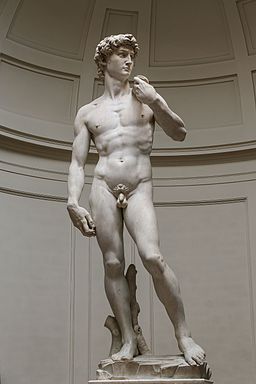Essence of Masculinity
The essence of masculinity is expendibility.
To illustrate this idea of masculinity, I have chosen the statue of David by Michelangelo.
Here is a young man prepared to risk his life in order to prevent deaths in battle of his people. This is the idea of expendibility. As a man, David was expected to offer his life for the greater good. 1 Samuel 17 gives the following account:
- While he was talking to them, the champion (Goliath, the Philistine from Gath) came up from the Philistine ranks and made his usual speech, which David heard.
- As soon as the Israelites saw this man, they all ran away from him and were terrified.
- The Israelites said, 'You saw that man who just came up? He comes to challenge Israel. The king will lavish riches on the man who kills him, he will give him his daughter in marriage and exempt his father's family from all taxes in Israel.'
- David asked the men who were standing near him, 'What would be the reward for killing this Philistine and saving Israel from disgrace? Who is this uncircumcised Philistine, to challenge the armies of the living God?'
- The people told him what they had been saying, 'That would be the reward for killing him,' they said.
Emphasis Mine
Here, this extract shows five (5) components of masculine society:
- Violence
- Honour
- Reward
- Oppression of women
- Advancing the Greater Good
The above extract shows that men consider violence to be the only option to solve problems. There are no other options presented like negotiations, surrender, or withdrawal. The situation between Israel and Philistine could only be resolved by the subjugation of one to the other.
The concept of male honour demanded this path of violence. It is disgraceful that this situation is unresolved.
To entice someone to take up the challenge from Goliath, Sual, the King of Israel, offered a generous reward. It is not enough for honour to elicit action from a man to rise to the level of violence needed, but a substantial reward is needed. This reward consisted of personal wealth, marriage into the royal family, and tax relief for the man's extended family. This reward enhanced the man's status through wealth, marriage, and source of benefit to his father's family.
As part of this reward, it is necessary to oppress women. The princess to be married off has no choice of husband; no choice as to when to marry; or, even, to marry at all. The oppression of women is a tool to control men.
The Greater Good here is advanced by removing a threat to the existence of Israel, either through annihilation or subjugation.
Expendibility is not disposibility as the life of a man has meaning in the former, but not in the latter. His death is supposed to advance the greater good of society. Men are supposed to accept this bargain.

No comments:
Post a Comment